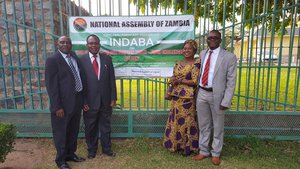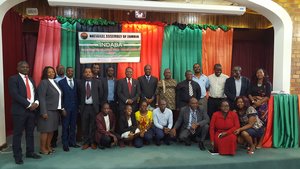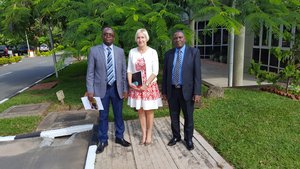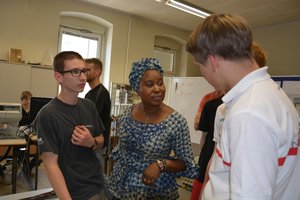High interest at the Second Youth INDABA at the Austrian Parliament
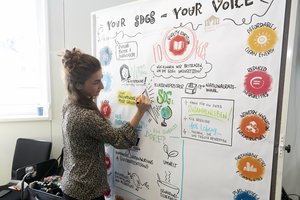
Being aware of one's own voice and thus shapinig one's own future - this objective was impressively met at the Second Youth INDABA "Your SDGs - Your Voice" on November 14, 2019. The students of three school classes from Vienna and Upper Austria accepted the invitation of the present members of the Joint Parliamentary Peer Group, Hon. Nico Marchetti, Hon. Eva-Maria Holzleitner and Hon. Alma Zadić to discuss the ideas and wishes of young people with political decision-makers in parliament.
The focus were the Sustainable Development Goals - SDGs. The Agenda 2030 and the SDGs were adopted by the United Nations in September 2015, and in Austria, too, all federal ministries are to implement the agenda in a coherent manner. Parliament also deals with the SDGs. Within the framework of the NorthSouthDialogue of Parliaments, SDG 4 focuses on ensuring inclusive and equitable quality education and promoting opportunities for lifelong learning for all.
In the group work, possibilities for participation in the implementation of the SDGs for each individual were discussed, but also policy requirements were formulated, as well as necessary changes for the achievement of the goals. The Youth INDABA took place in close cooperation with the Federal Youth Council, which advocates the participation of young people and their involvement in political decision-making processes. The results of the workshops were again documented in the form of graphic records and presented to the individual classes at the end of the day.
>>> Workshop-results as graphic records
High participation at the first youth INDABA with Austrian members of parliament
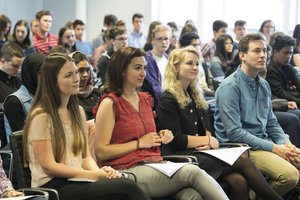
"Your SDGs - Your Voice" was the title of the first Youth-INDABA at the Austrian parliament, which was held on Friday, April 26 2019 within the framework of the NorthSouthDialogue of Parliaments. The declared goal of the event, namely to give the young people a voice in shaping their future, was made possible by the active participation of around 90 young people from three different school classes from Upper Austria and Vienna, as well as the PROSA (School for All) project.
Through the discussions between the present MPs of the Joint Parliamentary Peer Group, Hon. Nicho Marchetti, Hon. Eva-Maria Holzleitner and Hon. Alma Zadić (by proxy of Hon. Stephanie Cox), the Sustainable Development Goals and their objectives were brought to life by experts and pupils. It is crucial to set the course now for the achievement of the SDGs and thus a sustainable future for the youth. In this context, the exchange between young people and political decision-makers is of particular value.
The format of the event was based on the Youth Parliament. It was important, as in the parliamentary process, to obtain expert opinions and to work out compromises, as Parliamentary Deputy Clerk Susanne Janistyn-Novák emphasized. The results of the discussions in three workshops and in the plenary session were documented on drawing boards as graphic records, which will be handed over to the respective school classes by the members of parliament.
>>> Results as Graphic Records
Success of the Second INDABA at the National Assembly of Zambia
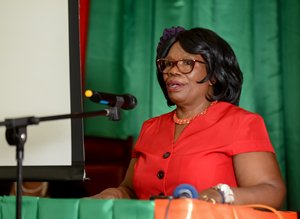
On the 4th and 5th of March the second INDABA on "Job Creation for our Zambian Youth" was held in the Zambian Parliament as part of the NorthSouthDialogue of Parliaments. More than 150 participants from politics, leading Zambian educational institutions, youth representatives, civil society organizations and also donors enthusiastically discussed the importance of practical training as a guarantor of a good job.
The event builds on the results of the first INDABA in October last year, in which the challenges of the Zambian education system in the context of employment opportunities of young people in the labor market were examined and analysed from different angles.
The Zambian Minister for Higher Education and Vocational Training, Prof. Nkandu Luo, pointed out in her opening speech that a functional and efficient education system is a basic prerequisite for the economic and social development of Zambia, especially against the background that tens of thousands of young people are looking for work each year. She stressed that the education sector in Zambia needs a complete transformation to give young people the skills they need to gain a foothold in working life. In Zambia, there is currently a gross mismatch between the training offered and the needs of the industry. This not only harms young people and the economy, but also inhibits economic growth, the opportunity to earn taxes and to build a stronger social system.
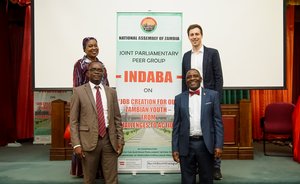
Prof. Luo was enthusiastic about the dual apprenticeship training system in Austria that she had seen duriing her working visit to Austria. For Zambia, the close integration of the economy, the public employment service and the relevant educational institutions in the area of training young people is a rahtre new territory. Minister Luo in her speech emphasized the importance of the cooperation with Austria. Related reforms, which have a strong practical relevance and are designed to build up skilled workers for Zambia's key economic sectors, are necessary and indispensable.
The NorthSouthDialogue of Parliaments aims at implementing the SDG 4.4, i.e. "By 2030, significantly increase the number of young people and adults who have the relevant skills, including professional and occupational skills for employment, decent work and entrepreneurship". The INDABA in Zambia came at a very appropriate time. Due to the contact with the deputies of the Joint Parliamentary Peer Group from Austria, an exchange was initiated with Austria, which offers some experience in terms of a dual educational system and is considered as "best practice" example for its vocational training system. Minister Luo sees herself encouraged in further steps towards the expansion of a practical training system in Zambia. She had already submitted a corresponding bill in the Council of Ministers.
Hon. Nico Marchetti (ÖVP), who, as a representative of the Austrian peer group, welcomed the participants, pointed out in his speech that today's generation of young people in Zambia and in Austria face similar challenges because of the rapid technological leaps of recent years. Environmental impact problems, digitization, scarcity of resources and mobility pose major challenges and will have a strong impact on labor markets and hence the education system of the future. It is the duty of politicians to be proactive and to set a framework in which the youth can get involved. Education politics needs to plan and think ahead in order to enable young people to learn what they need in the future in the labor market. The ultimate goal for both countries must be to provide young people with an education that not only enables them to build a good, self-determined life for themselves, but also to contribute to the further development of their country.
Nico Marchetti also conveyed the greetings of the Austrian Federal Minister of Education, Dr. Heinz Fassmann, who in January of this year signed a memorandum of understanding with Minister Luo, which integrates Zambia into the Austrian-African-Research Network and also promotes cooperation at university level.
The presentations of the experts from Austria met great interest. Not only the questions in plenary, but also the group work in which the experts were involved, testified the desire of the Zambian participants to strengthen the chances of the Zambian youth to work in the formal sector through targeted measures in the vocational training sector. Representatives of women's organizations, as well as principals, were particularly interested in learning how to train girls and young women better in technical occupations. Here, the Austrian experts stated that this is still a challenge in Austria, too, and that perhaps one can come up with ideas together on how to bring about improvements here.
Zambian Minister for Higher Education in Vienna
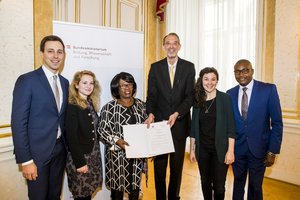
From the 23rd to the 25th of January 2019, the NorthSouthDialogue of Parliaments accompanied a Zambian delegation around the Minister of Higher Education, Prof. Nkandu Luo, on their visit to Austria. The visit was initiated by the Austrian members of the Joint Parliamentary Peer Group, Hon. Nico Marchetti, Hon. Eva.-Maria Holzleitner and Hon. Stephanie Cox, which is implementing activities perteining to education and youth with the Zambian parliament.
23rd to 27th of January 2019: Minister LUO in Vienna
At a meeting of the Federal Minister of Education, Science and Research, Dr. Heinz Fassmann and Minister Nkando Luo, a Memorandum of Understanding was signed, which establishes a cooperation within the framework of the African-Austrian Research Network in the next 3 years. The Austrian (dual) education system was presented at a round table in the ministry. In the further course, the delegation visited different institutions in Vienna, Upper Austria and Styria. Generally, the interest of the delegation layed in the exchange of information in the areas of college education, apprenticeship training as well as the topics of agriculture and montanistics. Opportunities for future cooperation in these areas were discussed.
Minister Luo and her delegation were welcomed, among others, at the University of Natural Resources and Life Sciences (BOKU), the Impact Hub Vienna, the training center of the Austrian Federal Railways in Linz, the University of Applied Sciences Upper Austria, Campus Wels, the higher education and research institute for agriculture and agricultural occupations in Raumberg-Gumpenstein and the University for Montanistic in Leoben.
In Upper Austria, which has been supporting the NorthSouthDialogue of Parliaments for a long time, the Zambian delegation was welcomed in the federal parliament by the 3rd president, Gerda Weichsler-Hauer, and the bench head of the peoples party, Helena Kirchmayr (representing the head of province Thomas Stelzer).
Delegation visit to Zambia
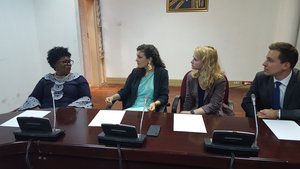
The Austrian members of the Joint Parliamentary Peer Group visited Zambia in October 2018 to meet their peers and learn about project realted aspects. Hon. Marchetti, Hon. Holzleitner and Hon. Cox present their impressions in an interview.
10. bis 16. Oktober 2018 - Delegationsbesuch in Sambia
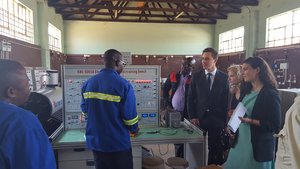
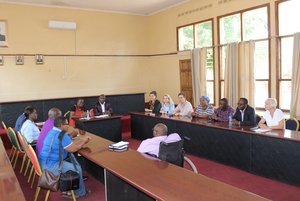
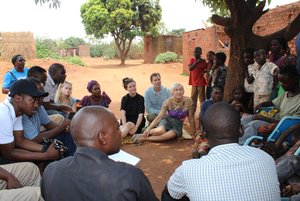
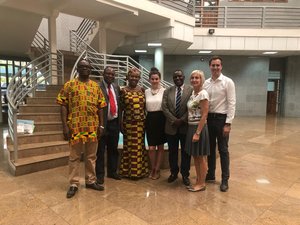
Ziele der Delegationsreise waren u.a. das gegenseitige Kennenlernen mit den sambischen Abgeordneten, der Besuch verschiedener thematisch relevanter Institutionen und Organisationen, sowie der Austausch von Erfahrungen in Bezug auf die Implementierung des SDG 4 in Sambia.
PNSD: Welchen Herausforderungen in Bezug auf Bildung und Ausbildung sieht sich die sambische Gesellschaft und Politik gegenüber?
Abg.z.NR Marchetti: Die größten Herausforderungen sind einerseits die Lehrer*innenausbildung an sich und andererseits die rund 2.500 Community Schools. Diese bekommen de facto kein Geld vom Staat und die Lehrer*innen arbeiten ehrenamtlich bzw. leben von Spenden aus der Bevölkerung.
Abg.z.NR Holzleitner: Ein grundsätzliches Problem scheint der Umstand, dass die Menschen oft gar nicht über ihr Recht auf Bildung Bescheid wissen. Dies ist besonders kritisch bei Kindern mit Beeinträchtigungen, die einfach von Schulen abgewiesen werden und somit der Bildung fern bleiben. Die Lehrer*innenausbildung müsste sicherlich reformiert werden. In diesem Zusammenhang ist die ungenügende und veraltete Ausstattung der Universitäten, aber auch der Schulen, sicherlich eine große Herausforderung.
PNSD: Inwiefern lassen sich Parallelen bzw. Unterschiede zur Situation in Österreich herstellen?
Abg.z.NR Holzleitner: Ich denke, eine Parallele zu Österreich ist, dass (Aus-)Bildung nicht durchlässig ist, pro Schulstufe wird das System selektiver. Anders als bei uns sind die Gruppengrößen in den Klassen viel zu hoch, um qualitativ guten Unterricht zu gewährleisten. Die Politik müsste finanzielle Mittel bereitstellen, denn Investitionen in Bildung und Jugend sind Investitionen in die Zukunft!
Abg.z.NR Cox: Ich finde das plakativste Beispiel ist die duale Berufsausbildung in Österreich. Wir haben in Sambia eine Schule besucht, welche Jugendliche auf einen Beruf vorbereiten. Jedoch gibt es dort kein duales System an zwei Lernorten, also die praktische Ausbildung in einem Betrieb und die theoretische in einer Berufsschule. In Sambia ist die Berufsausbildung sehr theoretisch und folglich sind die Chancen auf eine Anstellung direkt nach der Ausbildung geringer.
PNSD: Wie kann Österreich bzw. der Parlamentarische NordSüdDialog dem Partnerland Sambia in diesem Kontext unterstützen?
Abg.z.NR Cox: Österreich kann einerseits mit Unternehmen vor Ort Kontakt aufnehmen und sie für die duale Ausbildung begeistern. Jedoch müssen auch die Ausbildungsstätten selber einen dualen Weg einschlagen. Dies bedeutet, dass die Jugendlichen hauptsächlich in den Betrieben sind und nur für eine gewisse Zeit in den Schulen. Bei ihrem Besuch in Österreich konnte sich die Ministerin für Hochschulbildung (Anm. d. Redaktion: Hon. LUO besuchte Österreich am 26. und 27. November 2018) Best-practice Beispiele ansehen und Informationen einholen, wie man die duale Ausbildung umsetzen kann.
Abg.z.NR Holzleitner: Ich finde auch, dass die duale Ausbildung/Lehre eine Chance für Sambia wäre und hier könnte Österreich sicherlich unterstützen. Insgesamt muss sich die nationale Ebene aber stärker zuständig für Schulen fühlen und auch die ländlicheren Gebiete mit Angeboten der Bildung und Ausbildung versorgen.
Abg.z.NR Marchetti: Ich denke, wir könnten insbesondere in Sachen Lehrer*innenausbildung und der Konzeption für die entsprechenden Curricula unterstützend wirken.
PNSD: Welchen Eindruck haben Sie von der Herangehensweise in Bezug auf die Implementierung der Sustainable Development Goals in Sambia?
Abg.z.NR Marchetti: Ich habe den Eindruck gewonnen, dass die SDGs durchaus Thema sind und in der Arbeit einiger Politiker*innen, insbesondere Abgeordneter, eine Rolle spielen. Besonders in Bezug auf SDG 4, Hochwertige Bildung, und hier vor allem Zugang zu Bildung auch für Kinder mit besonderen Bedürfnissen, tut sich auf verschiedenen Ebenen einiges. Im November kommt eine Strategie in Bezug auf Menschen mit besonderen Bedürfnissen ins sambische Parlament. Es ist auch bis in die Regierungsebene in Diskussion, wie Community Schools in Zukunft unterstützt werden können. Beim SDG 3, insbesondere in Bezug auf sexuelle und reproduktive Gesundheit, gibt es große Widersprüche zwischen Gesundheitspolitiker*innen und Bildungspolitiker*innen bzw. zwischen Gesellschaft und Kirche. Diesen gordischen Knoten müsste man zuerst auflösen, damit sich in diesem Bereich etwas bewegt.
Abg.z.NR Holzleitner: Mein Eindruck ist ähnlich wie in Österreich, sprich es gibt keine Koordinierung in dem Sinne, dass alle Ergebnisse und Fortschritte gesammelt und interministeriell behandelt werden. Die SDGs sind außerhalb der entwicklungspolitischen Community kaum bekannt.
Abg.z.NR Cox: Ich denke auch nicht, dass die SDGs an erster Stelle der politischen Agenda stehen. Aber sie sind eine sehr gute Möglichkeit für Projekte, Bewusstsein zu schaffen und sie können ein guter Anlass sein, um einen produktiven Austausch und internationale Zusammenarbeit zu verstärken, wie beispielsweise auch in unserem parlamentarischen Austausch mit Sambia.
PNSD: Wie hat sich das Kennenlernen bzw. die Zusammenarbeit mit den sambischen Kolleg*innen der Joint Parliamentary Peer Group gestaltet?
Abg.z.NR Holzleitner: Das Kennenlernen war sehr angenehm und die Zusammenarbeit funktioniert tadellos. Es war spannend, über die politische Entwicklung in Sambia zu sprechen und die Probleme und Herausforderungen von Opposition und Regierungspartei zu erfahren. Das Kennenlernen hilft uns als Peergruppe, die jeweiligen Partner-Abgeordneten, die Politik, das Land und seine Gegebenheiten besser zu verstehen. Bei einem Besuch eines SOS Kinderdorf in Chipata konnten die sambischen Abgeordneten direkt vor Ort auch Probleme klären und Unterstützung anbieten.
Abg.z.NR Cox: Dem kann ich nur zustimmen. Eines meiner schönsten Erlebnisse dieses Besuchs war, dass ein Kollege bei diesem Besuch in Chipata sofort auf die Anliegen der Dorfbewohner*innen reagiert hat und einen Krankenhausaufenthalt für zwei erkrankte Burschen organisiert, weil es im Dorf keine ärztliche Behandlung gibt. Ich fand diesen Hands-on-approach sehr inspirierend.
Ansonsten gestaltet sich das Leben der Abgeordneten natürlich ganz anders als in Österreich, aber das ist wahrscheinlich in jedem Land so. Ich habe den sehr menschlichen Austausch sehr geschätzt. Der Erfahrungs- und Wissensaustausch zwischen Kolleg*innen ist sehr wertvoll.
Abg.z.NR Marchetti: Wir haben uns im Rahmen der Besuche der unterschiedlichen Institutionen besser kennengelernt und intensiv ausgetauscht. Höhepunkt war eine gemeinsame Sitzung der Peer Group am Montag, wo wir unsere Eindrücke nachbesprochen und gemeinsame Themen für die Zukunft geplant haben. Die Abgeordneten aus Sambia haben sich viel Zeit genommen und waren auch sehr ehrlich und zugänglich für kritische Diskussionen. Insgesamt konnte ich einen sehr positiven Eindruck von der Zusammenarbeit der Peer Group gewinnen und wir werden auch in Zukunft laufend in Kontakt bleiben.
PNSD: Welche Gemeinsamkeiten haben sich in Bezug auf eine weitere Zusammenarbeit im Parlamentarischen NordSüdDialog ergeben? Gibt es konkrete Ideen für den zukünftigen Austausch?
Abg.z.NR Cox: Ich finde das Thema der "dualen Ausbildung" sollten wir auf jeden Fall weiter verfolgen. Ich habe hier bereits auch einen ersten Kontakt mit der UNIDO hergestellt. Es ist auch bereits zu einem Gespräch mit der österreichischen Vertreterin von SOS Kinderdorf gekommen, und ich denke, unser Feedback zum Projektbesuch in Chipata hat dem Team in Österreich auf jeden Fall weitergeholfen.
Abg.z.NR Marchetti: Bei den Besuchen auf den Universitäten haben wir festgestellt, dass sowohl Sambia als auch Österreich ein großes Problem dabei haben, Frauen für technische Ausbildungen, Studien und Berufe zu begeistern. Hier haben wir besprochen, dass wir gemeinsam an Lösungen arbeiten möchten. Aber auch über Austauschprogramme für Studierende haben wir gesprochen. Dazu ist die Ministerin für Hochschulbildung im November 2018 in Wien und wir arbeiten daran, im Rahmen ihrer Reise auch dieses Thema in Österreich voranzutreiben.
Abg.z.NR Holzleitner: Es sollte unser gemeinsames Ziel sein, den Dialog einer noch breiteren Bevölkerung in beiden Ländern zu vermitteln, auch im Sinne der Agenda 2030 – je mehr Menschen von den SDGs erfahren, desto mehr politischer Druck kann aufgebaut werden, um die Umsetzung voranzutreiben.
>>> VIDEO über den Besuch des SOS Kinderdorf in Chipata
First INDABA in Zambia focussing on youth employment
The Joint Parliamentary Peer Group (JPPG) of the NorthSouthDialogue of Parliaments with MPs from Zambia and Austria focuses its cooperation on youth and education. This is part of the (inter)national work to implement the Sustainable Development Goal 4 (SDG 4), namely to ensure inclusive and quality education and promotion of lifelong learning opportunities for all in Austria and Zambia.
On the 8th and 9th of October the first INDABA on "Job creation for our Zambian youth - from challenges to action" took place in Lusaka. In addition to the representatives of the JPPG and the National Assembly of Zambia, numerous experts and stakeholders from the administration, civil society and science participated in the two-day event.
The Government of the Republic of Zambia recognizes that education is an important factor in the fight against poverty and seeks an education system designed to improve equal access to quality facilities. The main objective of the National Implementation Framework III is therefore to qualify human resources, with a particular focus on increasing learning and reducing inequalities and inefficiencies.
21st of Februar 2018 - Working meeting in Lusaka
The goals and content of the INDABA in the Zambian parliament were defined in two discussions between the JPPG members of the National Assembly of Zambia, representatives of the Parliamentary Reforms Program Department of the NAZ and the project coordinator, Jutta Kepplinger. The title of the event is "Job creation for our Zambian Youth - from challenges to action".
The Committe on Youth, Sports and Child Matters of the Zambian Parliament is currently working on a report on youth unemployment in Zambia. This will be presented in June 2018 and can be used as a reference framework for the INDABA.
7th to 13th of May 2017 - Visit of the Zambian MPs of the JPPG
During their visits, the four Zambian MPs of the Joint Parliamentary Peer Group (JPPG) were able to gain a comprehensive picture of the political and administrative functioning of the Austrian Parliament as well as of numerous aspects related to SDG 4. The program included a guided tour of the Austrian Parliament, an introduction into the legislative process in Austria, a presentation on the ways of communication between parliament and the Austrian population, and on the democratic education of children and young people. In the context of the last aspect, the seven members of the JPPG participated in the democracy workshop (DemokratieWerkstatt) with a student group from Upper Austria.
The focus of the program, however, was the exchange with numerous organizations and institutions in Vienna, Upper and Lower Austria, which are in any way connected to the implementation of the SDGs in Austria. The main focus was on dual education as well as reproductive and sexual health and education in Austria. The MPs visited, a.o. the Austrian National Association for Family Planning (ÖGF), the Teaching Center for Young People at Work, the NGO "Selbstlaut" (Prevention of Sexualized Violence against Children), the Vocational School Längenfeldgasse, the Salzkammergut Klinikum (Universitätslehrkrankenhaus), the hospital Gmunden, the Energy AG in Gmunden (Water and solar energy), as well as the agricultural vocational and technical school in Gießhübel. The representatives from Zambia were accompanied by the project director as well as an Austrian MP member of the JPPG and they were extremely interested in the different ways that Austria has established to achieve its national (education) goals.
In a joint workshop, concrete goals and communication structures were also developed for the future cooperation of the JPPG.

